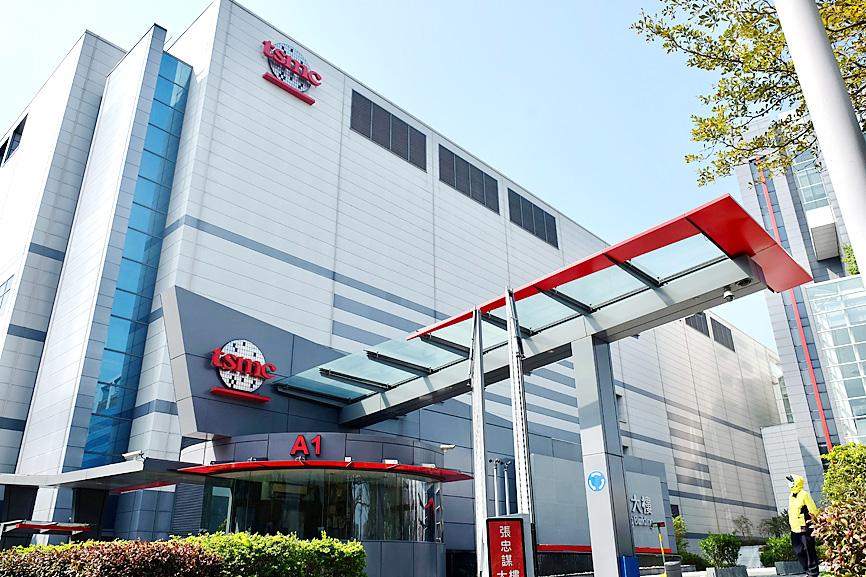Taiwan Semiconductor Manufacturing Co (TSMC, 台積電) yesterday unveiled a plan to hire 9,000 people this year in the latest round of recruitment as the chipmaker races to boost capacity to alleviate a chip crunch and safeguard its technology advantage.
TSMC’s talent recruitment this year might be the most ambitious in its history, while last year’s drive of 8,000 added recruits doubled the 4,000 new hires that it averaged over the preceding few years.
The latest drive — for fabs in Hsinchu, Taichung and Tainan — aims to catch up with growth in the company and new technology development, the Hsinchu-based chipmaker said.

Photo: Sam Yeh, AFP
The annual hiring campaign was launched amid shortages of a variety of chips, especially auto chips.
In January, the company revised its five-year revenue forecast to growth of 10 to 15 percent from a previous estimate of 5 to 10 percent, which it attributed primarily to stronger-than-expected demand for applications using high-performance computing and 5G smartphones.
TSMC in January said that it plans an annual capital expenditure of US$25 billion to US$28 billion (US$884.14 million to US$990.24 million), mostly to develop and manufacture advanced 3-nanometer, 5-nanometer and 7-nanometer chips.
The recruitment plan would bring the chipmaker’s overall headcount to more than 60,000 employees, up from 51,297 at the end of 2019.
TSMC hosted a recruitment event at National Taiwan University yesterday, the first in a series of hiring activities to take place at local universities this month and next.
The company expects about 3,000 students to sign up for job interviews, and said that next month it would begin accepting applications to a new internship program.

With an approval rating of just two percent, Peruvian President Dina Boluarte might be the world’s most unpopular leader, according to pollsters. Protests greeted her rise to power 29 months ago, and have marked her entire term — joined by assorted scandals, investigations, controversies and a surge in gang violence. The 63-year-old is the target of a dozen probes, including for her alleged failure to declare gifts of luxury jewels and watches, a scandal inevitably dubbed “Rolexgate.” She is also under the microscope for a two-week undeclared absence for nose surgery — which she insists was medical, not cosmetic — and is

CAUTIOUS RECOVERY: While the manufacturing sector returned to growth amid the US-China trade truce, firms remain wary as uncertainty clouds the outlook, the CIER said The local manufacturing sector returned to expansion last month, as the official purchasing managers’ index (PMI) rose 2.1 points to 51.0, driven by a temporary easing in US-China trade tensions, the Chung-Hua Institution for Economic Research (CIER, 中華經濟研究院) said yesterday. The PMI gauges the health of the manufacturing industry, with readings above 50 indicating expansion and those below 50 signaling contraction. “Firms are not as pessimistic as they were in April, but they remain far from optimistic,” CIER president Lien Hsien-ming (連賢明) said at a news conference. The full impact of US tariff decisions is unlikely to become clear until later this month

GROWING CONCERN: Some senior Trump administration officials opposed the UAE expansion over fears that another TSMC project could jeopardize its US investment Taiwan Semiconductor Manufacturing Co (TSMC, 台積電) is evaluating building an advanced production facility in the United Arab Emirates (UAE) and has discussed the possibility with officials in US President Donald Trump’s administration, people familiar with the matter said, in a potentially major bet on the Middle East that would only come to fruition with Washington’s approval. The company has had multiple meetings in the past few months with US Special Envoy to the Middle East Steve Witkoff and officials from MGX, an influential investment vehicle overseen by the UAE president’s brother, the people said. The conversations are a continuation of talks that

CHIP DUTIES: TSMC said it voiced its concerns to Washington about tariffs, telling the US commerce department that it wants ‘fair treatment’ to protect its competitiveness Taiwan Semiconductor Manufacturing Co (TSMC, 台積電) yesterday reiterated robust business prospects for this year as strong artificial intelligence (AI) chip demand from Nvidia Corp and other customers would absorb the impacts of US tariffs. “The impact of tariffs would be indirect, as the custom tax is the importers’ responsibility, not the exporters,” TSMC chairman and chief executive officer C.C. Wei (魏哲家) said at the chipmaker’s annual shareholders’ meeting in Hsinchu City. TSMC’s business could be affected if people become reluctant to buy electronics due to inflated prices, Wei said. In addition, the chipmaker has voiced its concern to the US Department of Commerce